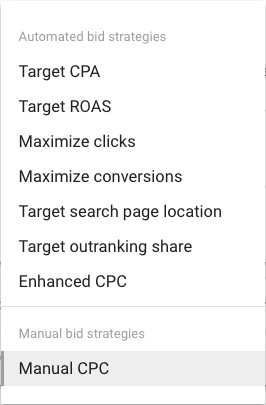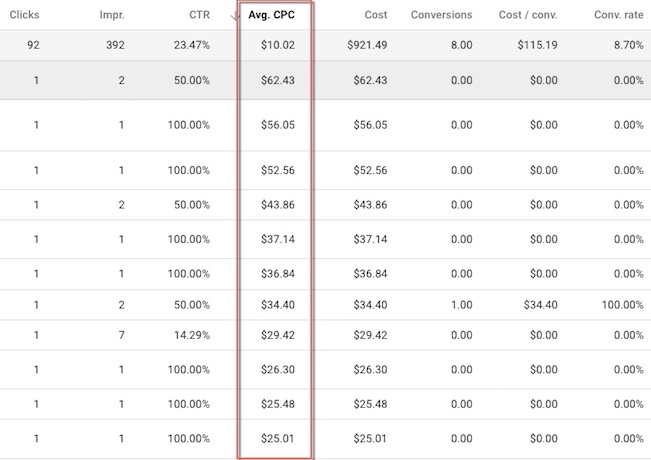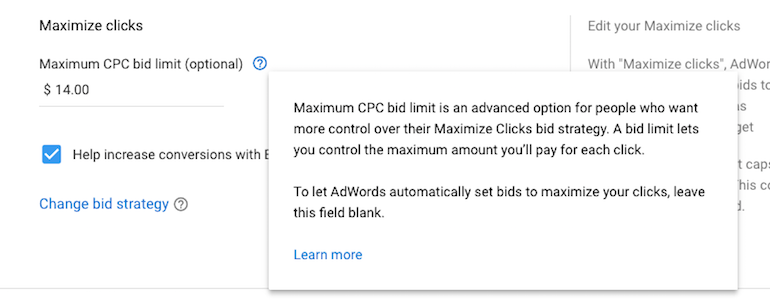Reasons to Not Use an Automated PPC Bidding Strategy

AdWords offers many fantastic automated PPC Bidding Strategies for your accounts and campaigns. In a previous article, I discussed When Flexible Bid Strategies Are Right For You. Recently, Krista Hsieh wrote an excellent article about Testing New Bidding Strategies Through AdWords Experiments. In this article, we are going to discuss reasons you might want to avoid using automated bid strategies.
How Do Automated Bid Strategies Work

How do automatic bid strategies work? AdWords Smart bid strategies use machine learning (AI) based on the historical conversion performance in your account or campaign. The AI uses the historical data points to make bid adjustments in each individual auction based on the predicted outcome. In order for the system to make the best adjustments, it requires accurate and consistent conversions trends.
You also need to allow the bid strategy to run for at least 2 – 3 weeks before determining if the strategy is right for your campaign. Also, as Krista described in her article, it is a great idea to test the bid strategy in an experiment before applying it to your campaigns.
15 Conversions Minimum
AdWords says you need 15 conversions in the last 30 days. Um, not so fast. I would say 15 conversions at the absolute minimum. Not only should your campaign have at least 15 conversions, but you really need to have at least one conversion every other day. Also, if you are going to test the bid strategy inside an Experiment, it will split your data by 50%, so you will want to have double the minimum.
One thing to consider, is if your campaign has sporadic conversions or wild seasonal fluctuations, you may want to avoid using any bid strategies that focus on conversions, CPA, or even revenue. In the example below, this campaign had 16 conversions in February, but we can see the performance is not consistant. This campaign would not be the best candidate for automatic bid strategies that focus on conversions.

In this next example, you can see exact same campaign had only 5 conversions in March. AdWords system may be smart, but these trends are not steady enough to rely on automatic bid strategies that focus on historical conversion trends. So, before you decide if bidding strategies are right for your campaign, you will want to review the performance over a longer date range.

Maximize Conversions and CPCs
In a situation where you do not have enough data, bid strategies like maximize conversions can go crazy and drive up the CPCs. In the example below, this campaign only had 8 conversions total, and maximize conversions drove up the CPCs. They had CPCs as high as $56 for a single click that didn’t result in a conversion. We can expect these types of CPCs for a lawyer, but these would be expensive clicks for most accounts.

Consider Your Conversions Types
Another thing you will want to consider is the type of conversions you are tracking. In this account, we have 17 conversions in the last 30 days, but 9 are phone calls and 8 are transactions. The system is unable to determine the difference between a good call and a bad call. The technology is not designed to see if the call duration was 2 minutes or 24 minutes. The system would simply optimize get the most conversions without consideration of type or quality. This is especially true for many lead generation clients, just because you received a lead, does not mean it will result in a sale.

Short Durations or New Campaigns
If your campaign is new or is only going to run for a short time, you may want to avoid most automated bid strategies. The only strategy that might make sense is Maximize Clicks. This strategy is focused on getting the most clicks within your budget and won’t rely as heavily on historical data. One word of caution, always set a max bid limit. Not setting maximum CPC bid limits is a receipt for disaster.

In some campaigns, I have found maximize clicks reduces our costs and improves the conversion performance. You can see a big difference in conversion performance after switching to maximize clicks. However, if you are interested in maintaining a dominant ad position, this bid strategy would focus on clicks and not position.

Localized or Niche Campaigns
Some accounts that are localized or have very niche products or services may want to stay away from automatic bidding. For example, if you are targeting a small area and narrow audience, you may want to go with manual CPCs so you can stay on top of your bids and budget. One option might be test Target Outranking Share if your competition is small and you know their domain.
Conversion Tracking
Check your tags often, if your tag breaks, your data will not be optimizing properly. There have been many occasions where the web developer updates the website and suddenly our conversion tracking is missing. Or worse, it has been installed on every page and recorded every visitor as a conversion. The machine learning will only be as accurate as the data it is receiving.
![]()
Closing Thoughts
Automated bid strategies can be an effective tool for many campaigns and accounts. However, you never want to set a bid strategy and forget to monitor performance. It might be a good idea to create automated notifications for any wild fluctuations so you can get on top of it quickly.



